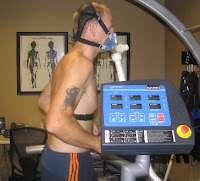 Two weeks ago I paid a visit to Diaz Human Performance for a VO2 Max and RMR test. The thinking behind getting them done was to establish a baseline of fitness prior to starting on my winter training program. I have discussed the RMR results in the Through th3 Wall Challenge post and there is nothing overly confusing with the figures although I am still surprised with the recommended level of caloric intake; 3074, still, as I am trying to lose some weight and some body fat using that number should help me achieve those goals. The only additional comments I can add were that the RMR revealed that my physiologiological makeup has left me predisposed to Type IIa and Type IIb or Fast Twitch; after some discussion about my sporting history my natural predisposition was further highlighted; track and field; long and triple jump, rugby and field hockey – all of which call for short sharp bursts of speed, although my best 1500 meters time from Secondary (High) school I remember as being in the five minute range, of course that was *** cough cough *** years ago. Of course this all bodes for some interesting times ahead as I look to extend my distance once again to the Marathon and beyond.
Two weeks ago I paid a visit to Diaz Human Performance for a VO2 Max and RMR test. The thinking behind getting them done was to establish a baseline of fitness prior to starting on my winter training program. I have discussed the RMR results in the Through th3 Wall Challenge post and there is nothing overly confusing with the figures although I am still surprised with the recommended level of caloric intake; 3074, still, as I am trying to lose some weight and some body fat using that number should help me achieve those goals. The only additional comments I can add were that the RMR revealed that my physiologiological makeup has left me predisposed to Type IIa and Type IIb or Fast Twitch; after some discussion about my sporting history my natural predisposition was further highlighted; track and field; long and triple jump, rugby and field hockey – all of which call for short sharp bursts of speed, although my best 1500 meters time from Secondary (High) school I remember as being in the five minute range, of course that was *** cough cough *** years ago. Of course this all bodes for some interesting times ahead as I look to extend my distance once again to the Marathon and beyond.For the VO2 Max test I was strapped up in a face mask akin to a test pilot and was set off walking in a treadmill, the pace built up over 12 minutes until I was at a flat out sprint or at least until I was unable to breath and run at the same time, I signaled enough with a thumbs down.
After catching my breath we discussed the results. I “blew” a 49.5 ml/kg/min – what does that mean? Well to start the test measures the maximum capacity to transport and utilize oxygen during incremental exercise. For an age grouper like myself this result is classed as "Superior", world class male athletes, cyclists and cross-country skiers typically exceed 80 ml/kg/min and a rare few may exceed 90 ml/kg/min. Here are some people you might have heard of and their results:
• Steve Prefontaine, 84.4
• Jeff Galloway, 73.0
• Frank Shorter, 71.3
My result can be improved on over time and this test has provided me with a solid baseline from which to build. It is suggested that the test is repeated every 12-16 weeks, this will place me half way through my winter training plan and will allow me time to make any adjustments as needed. I have some more reading and research to do to full translate the results and apply them to my training plan which officially starts on October 21st. As they say watch this space.

That looks scary and intimidating! What do you do to improve on your score?
ReplyDelete